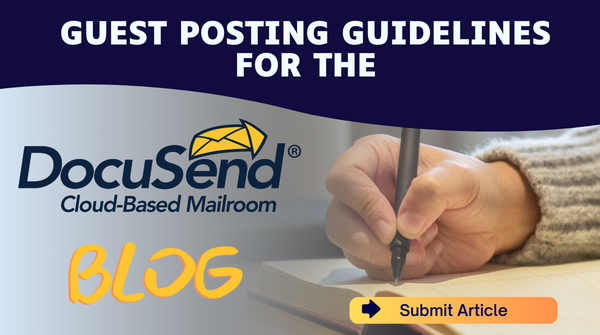Guest Posting Will Be Discontinued on DocuSend Starting July 1st, 2025

DocuSend Guest Blogger Guidelines:
The DocuSend Team wants to thank everyone who has contributed guest articles to our blog over the years. Thank you for providing our readers with useful knowledge. Your insights and experiences were invaluable. However, after careful consideration, we’ve decided to stop accepting guest articles on our platform, effective July 1st, 2025.
Hello and thank you for your interest in contributing to DocuSend! We appreciate your expertise in the SMB (Small and Midsize Business) niche and welcome your unique insights. Before submitting your content, please review our guidelines (content submissions must adhere to our quality standards to be considered for publication).
- 1. Relevance:
- 2. E-E-A-T (Experience, Expertise, Authoritativeness, Trustworthiness):
- 3. Originality:
- 4. Pitch-Free:
- 5. Post Length:
- 6. Ownership:
- 7. External Linking:
- 8. Images:
Ensure that your content aligns with SMB topics, focusing on subjects that resonate with our audience.
Prioritize content with good E-E-A-T to provide valuable and trustworthy information to our readers.
All content must be 100% original. Avoid plagiarism and self-plagiarism, and refrain from publishing the same content on other sites.
We only publish pitch-free content. Avoid self-promotional pieces and maintain a focus on delivering valuable information.
Articles should be a minimum of 1000 words, ensuring in-depth coverage of the chosen topic.
Once published, DocuSend owns the article, and it may be modified or removed at any time.
Limit external links to three per post. Ensure that links are relevant, lead to reputable sources with good domain authority, and follow HTTPS protocols.
If images are included, ensure that they are high-quality and properly attributed. Only use images for which you have the right to share.
AI as an Aid, Not the Sole Creator
The DocuSend team is committed to delivering outstanding, first-rate, pertinent content on our website. As a gesture of gratitude to all guest bloggers who contribute excellent, human-written content, and to honor the talent of those who strive to offer quality material, we also prioritize accepting content that is highly relevant.
Below are key aspects that our audience expects to find in the guest blogs that we accept.
The Human Touch Is Vital. While AI can aid in content creation, it's essential that the writer carefully reviews and edits the text that AI generates to make sure the content is accurate, clear, contains actual helpful information or tips for the reader instead of generic AI-generated phrases, and aligns with Google's Search Quality Guidelines.
For example, you can use AI for research or to create an initial draft of your text with relevant structure and keywords. Then, it’s time for you to step in to verify facts, smooth out the writing style to make it more natural for humans, remove repetitive or unnecessary pieces, and customize your article to resonate effectively with the target audience.
Uniqueness Is Crucial. DocuSend craves fresh perspectives. Rather than merely rehashing the content that is already there on the internet, leverage AI to gather data and brainstorm ideas. Based on that, you can provide a unique analysis, share your own insightful perspective on the topic, or furnish practical tips for the readers.
Transparency Promotes Trust. Don't be afraid to discuss in your post how you used AI technologies to write. It helps you gain the audience's trust and shows your commitment to ethical practices. It’s OK to add a simple statement like "This post was written with the assistance of AI writing tools, but the information was carefully researched and edited to ensure accuracy,"
It’s important for us to keep our content top-notch; that’s why we have strict standards. Remember that it’s crucial that articles you submit have high quality and originality and demonstrate E-E-A-T principles: experience, expertise, authoritativeness, and trustworthiness.
DocuSend Blog's Editorial Guidelines:
- 1. Guest Blogging Principles:
- 2. Quality Standards:
- 3. Ownership and Usage:
- 4. Content Decisions:
- 5. Essentials for Every Post:
- Fresh and innovative ideas, persuasive arguments, and exemplary writing. We refrain from republishing content available elsewhere.
- Articles that resonate with the writing style and tone of our blog—informal yet informative, avoiding unnecessary jargon.
- Appropriate acknowledgment of data, quotes, and external content cited in the article.
- Note: All data should be current.
- Limitations on promotional links: Only one link to your company's website within the post.
- Inclusion of 2-3 relevant links to DocuSend blog posts in your submission.
- 1 link to reputable sources with good domain authority and no spam score.
- 6. Types of Posts Accepted:
- 7. Types of Posts Not Accepted:
- 8. Formatting Tips:
- 9. Submission Process:
DocuSend cannot guarantee blog placement, and all submissions undergo editorial review based on relevance, SEO viability, and audience fit.
Submissions must meet our quality standards for acceptance.
Published articles remain exclusively on the DocuSend Blog. Contributors are encouraged to share published content links but cannot republish the same content elsewhere.
The blog team reserves the right to edit or modify content for update and optimization, include calls-to-action, use author photos, or remove posts.
DocuSend looks for original concepts, high-quality writing, and proper attribution of data. Posts should align with the blog's style and tone.
DocuSend accepts Experiment/Analysis and Canonical posts that offer valuable insights and actionable takeaways.
DocuSend does not accept content that duplicates existing blog topics, serves as a link-building scheme, is overly promotional, offensive, or inaccurate.
Follow formatting tips such as organizing content with headers, keeping paragraphs short, using lists, and including an introduction and conclusion.
Submit your blog post idea through our specified submission process. Send your piece to customersupport@docusend.biz.
By following these guidelines, you enhance your chances of contributing valuable content to DocuSend's blog. We look forward to your submissions!

